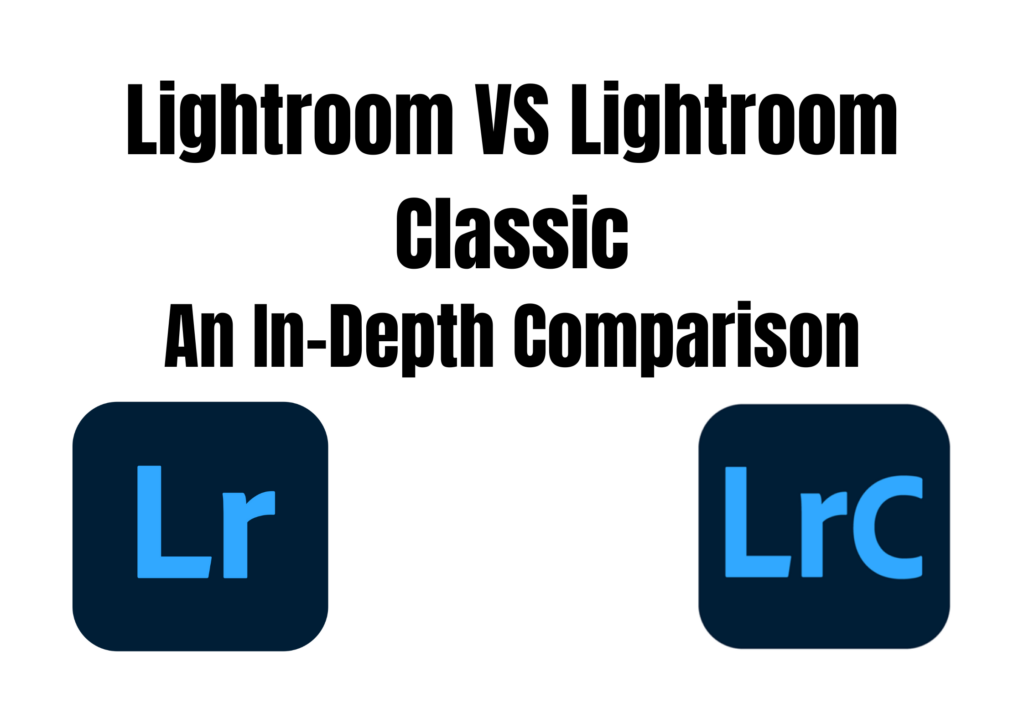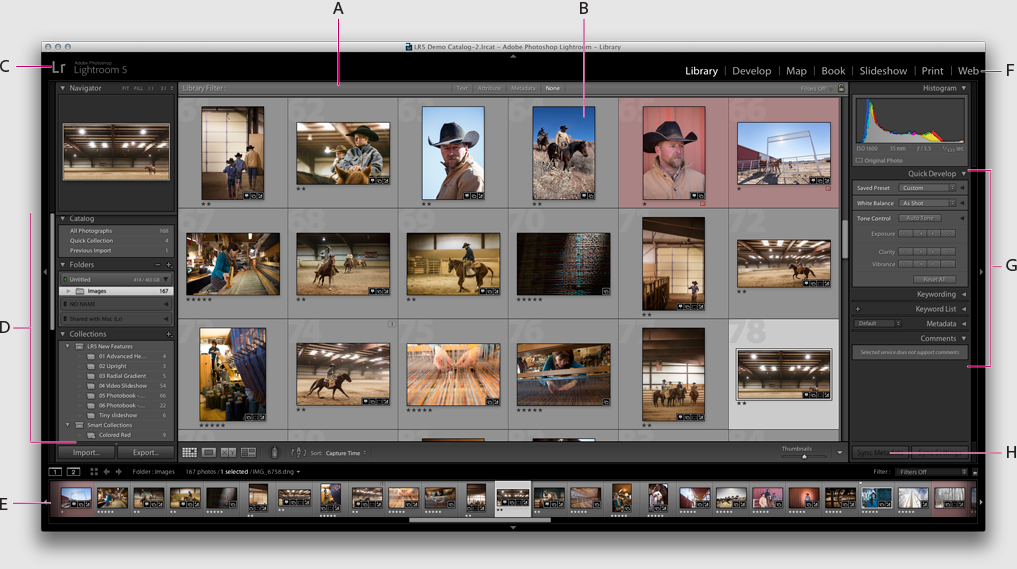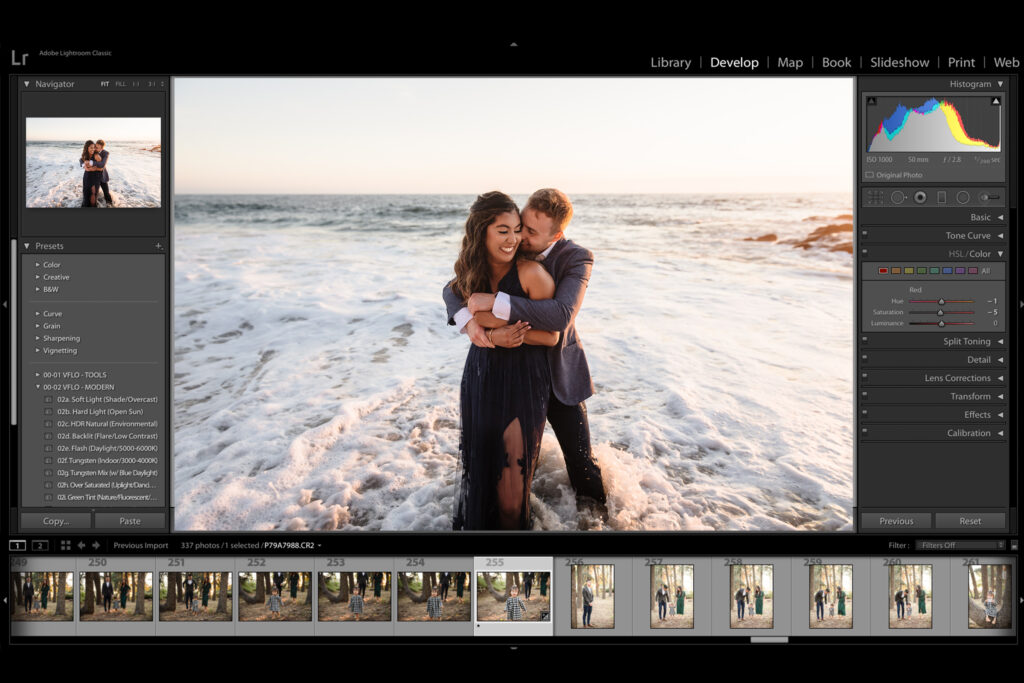Adobe’s Lightroom and Lightroom Classic are two powerful tools that serve different purposes within the world of photo editing. Both are part of the Adobe Creative Cloud ecosystem but cater to distinct user needs.
Lightroom is a modern, cloud-based application designed for users who prioritize mobility and accessibility, while Lightroom Classic offers a more traditional, desktop-focused workflow ideal for professional photographers.

Let’s get into their features, differences, and special elements in this Lightroom VS Lightroom Classic comparison and see which is better suited for your editing style.
Lightroom VS Lightroom Classic
Lightroom (often called Lightroom CC) is built with a sleek, intuitive interface for quick edits and on-the-go workflows. It’s designed for photographers who value simplicity and require cloud storage for accessing photos across multiple devices.
Lightroom Classic, on the other hand, remains the gold standard for desktop-based editing with unparalleled depth, control, and organizational capabilities. It’s ideal for professionals managing large libraries and performing advanced edits.
Features and Special Elements
Lightroom
1. Cross-Device Synchronization: Sync edits and images seamlessly across desktop, mobile, and tablet.
2. Cloud Storage: Automatically backs up photos to the cloud with 1TB or more storage options.
3. Automated Tools: Offers automatic adjustments for exposure, cropping, and tone.
4. Easy Sharing: Integrated social media or client proofing sharing options.
5. Simplified Interface: A user-friendly layout for beginners or casual users.
6. Presets and Filters: Pre-designed presets for creative enhancements with one click.
7. Non-Destructive Editing: Retain original files while applying edits.
Lightroom Classic
1. Advanced Editing Tools: Precision with radial filters, brushes, and gradient masks.
2. Local Storage Control: Allows you to manage where your files are saved.
3. Robust File Management: Catalog system for tagging, sorting, and organizing thousands of images.
4. Batch Editing: Apply edits to multiple photos simultaneously.
5. Customizable Workflows: Tailor panels, presets, and settings for a personalized experience.
6. Offline Editing: Edit without needing an internet connection.
7. Detailed Export Options: Customize image quality, resolution, and formats for professional outputs.

Major Differences and How They Affect Users
| Feature | Lightroom | Lightroom Classic | Impact on Users |
| Workflow Style | Cloud-based | Desktop-based | Cloud users gain mobility; Classic users get depth. |
| Accessibility | Available on multiple devices | Limited to desktop | Multi-device sync favors mobile users. |
| Editing Precision | Basic to moderate | Advanced | Professionals need Classic’s precision tools. |
| Organizational Tools | Basic tagging | Advanced catalog system | Classic users can manage large libraries. |
| Storage | Cloud storage with subscription | Local storage on hard drives | Cloud backup secures files, but local saves allow control. |
| Batch Processing | Limited | Extensive | Event photographers benefit from Classic. |
| Offline Use | Requires an internet connection | Fully functional offline | Classic is better for remote environments. |
| Export Options | Limited customization | Detailed and professional | Classic is essential for print-ready outputs. |
| Ease of Use | Beginner-friendly | Requires more learning | Lightroom’s simplicity is great for beginners. |
| Custom Workflows | Fixed workflow | Highly customizable | Advanced users thrive with Classic’s flexibility. |
How These Differences Affect Your Editing Style?
Lightroom is ideal for travel photographers who want to quickly edit and share photos on the go. Its presets and automated tools simplify edits, making it accessible to beginners.
Lightroom Classic is indispensable for studio photographers who are handling detailed retouching and organizing vast image libraries. Its advanced tools provide precision edits that are essential for professional projects.
Editing Expectations: What Each Tool Offers
Lightroom: Quick and Stylish Edits
- Tone Adjustments: Adjust brightness, contrast, and exposure effortlessly.
- Color Enhancements: Modify hue, saturation, and vibrance with intuitive sliders.
- Preset Applications: Use one-click presets for dramatic effects or subtle adjustments.
- Basic Retouching: Smooth skin and remove minor blemishes with built-in tools.
- Cloud Access: Edit and sync work seamlessly across devices.
Lightroom Classic: Advanced Professional Edits
- Layered Adjustments: Apply multiple gradient filters and brush strokes.
- Lens Corrections: Fix distortions, chromatic aberrations, and vignetting.
- Noise Reduction: Eliminate noise in low-light photos with fine control.
- HDR and Panorama Merging: Create stunning high-dynamic-range or panoramic images.
- Advanced Color Grading: Customize highlights, midtones, and shadows for professional-grade results.

Which Tool Should You Choose?
Lightroom: Best for Modern, Cloud-Based Editing
- Lightroom suits photographers who value simplicity, mobility, and quick edits. Ideal for:
- Travel Enthusiasts: Sync and edit photos on the go without worrying about storage.
- Social Media Influencers: Share polished photos instantly.
- Beginners: Learn the basics with a clean, intuitive interface.
Lightroom Classic: Best for Detailed, Professional Workflows
- Lightroom Classic is the choice for professionals needing advanced control and organization. Perfect for:
- Studio Photographers: Manage high volumes of RAW files with ease.
- Event Photographers: Use batch processing for weddings or large events.
- Serious Hobbyists: Delve into advanced tools for mastering photography.
Frequently Asked Questions
Can I switch between Lightroom and Lightroom Classic?
Yes, but the process is manual. Lightroom and Lightroom Classic do not sync edits automatically. You need to export photos from one platform and import them into another. This can be time-consuming if you frequently switch between devices or workflows, so committing to one tool for consistency is best.
Does Lightroom Classic offer cloud storage?
Lightroom Classic primarily uses local storage but allows optional syncing of selected photos to Adobe’s Creative Cloud. Unlike Lightroom’s full cloud integration, this syncing is not automatic for all images. You can back up your catalog manually or use external drives for comprehensive storage management.
Is Lightroom better for beginners?
Lightroom’s simplified interface and tools make it an excellent choice for beginners. It offers guided tutorials, easy presets, and intuitive sliders that simplify editing. Lightroom Classic, by contrast, has a steeper learning curve due to its extensive features.
Can Lightroom Classic be used without an internet connection?
Absolutely. Lightroom Classic is designed for offline use and provides full functionality without internet access. This is especially beneficial for photographers working in remote locations or areas with limited connectivity.
Which tool is better for large photo libraries?
Lightroom Classic is superior for managing extensive photo libraries. Its advanced cataloging system includes tagging, keywording, and folder hierarchies. Lightroom’s organizational tools are basic, making it less suitable for professional workflows with thousands of images.

Can I use both Lightroom and Lightroom Classic together?
Yes, many photographers use both to leverage their strengths. For example, you might use Lightroom for quick edits on the go and Lightroom Classic for advanced retouching in your studio. However, syncing between the two requires manual steps.
Which is more cost-effective?
Both tools are included in Adobe’s Photography Plan, which starts at $9.99/month. The cost-effectiveness depends on your workflow. If you don’t need advanced features, Lightroom alone may suffice, making it a simpler choice.
Choosing between Lightroom and Lightroom Classic comes down to your editing style, storage needs, and level of expertise.
Lightroom is perfect for photographers who value mobility and simplicity, while Lightroom Classic offers the advanced precision and organization professionals require.

